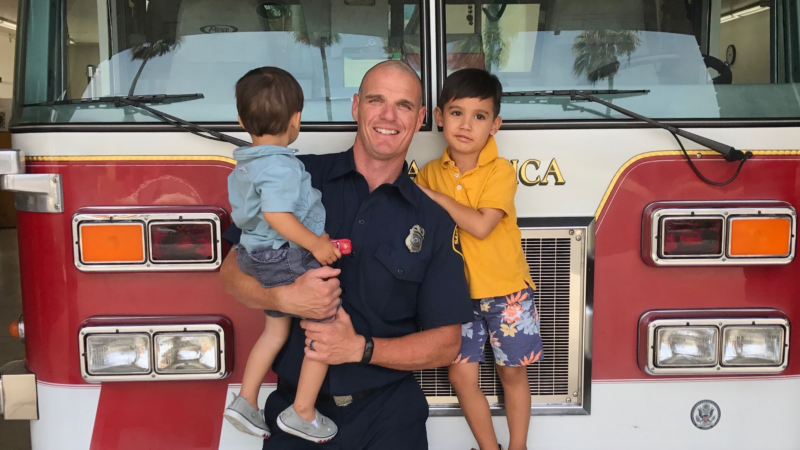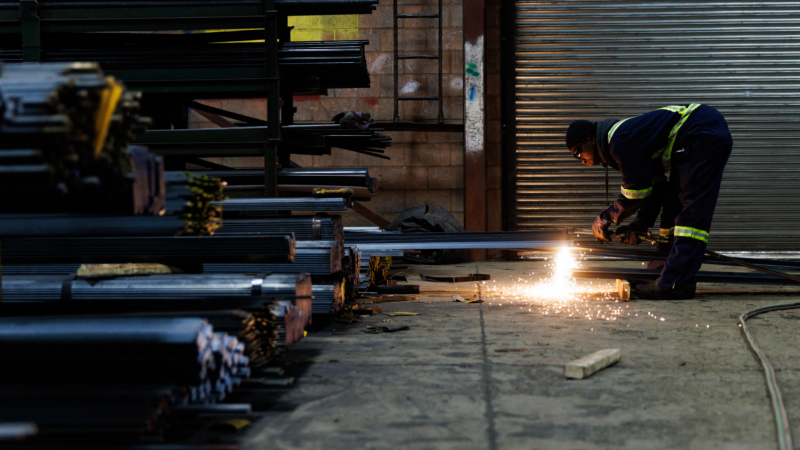A California fifth grader interviews his firefighter father
When the fires in Los Angeles broke out just over one week ago, fire captain Shane Lawlor was quickly dispatched to the Palisades. He has been at work ever since. On his first day, Lawlor was on his team’s fireline for 20 hours straight with no breaks for food or sleep. He’s still working the fireline and has been sleeping on-site or at his station in Santa Monica when he’s not on duty.
Back at his home in Carlsbad, Calif., Lawlor’s son, Cian Lawlor, is a fifth grader and budding journalist at Magnolia Elementary School. The 11-year-old has a new podcasting kit that his family recently got him for Christmas.
Earlier this week, NPR asked Cian to interview his dad over Zoom. It was the first rest day since the fires began for Lawlor, who took the call from his post at the Santa Monica Fire Department Station 2. Cian was at their home in Carlsbad, a few hours south of L.A. This was also the first time the father and son had connected in a week.
“I’m glad he gets to do this and help people in need,” Cian says about his dad’s job. “He puts out his heart for the greater good.”
This interview was prepared and conducted by Cian, with help from Magnolia Elementary’s broadcasting club, MagTV’s director, Andrew Luria. The photos were taken by Cian’s friend and fellow Magnolia student journalist, Eivan Wheyland. NPR sat in on their conversation.
This interview has been edited for length and clarity.

Cian Lawlor: What goes through your mind when you’re fighting fires such as this one? Were you scared?
Shane Lawlor: Scared? Not so much. But definitely, you have to take care of yourself. You have to understand your surroundings. It is so fast-moving, and there’s so much going on that hearing important radio traffic that could be very important is very difficult. Making sure that you know when you are in the wrong place and you’ve got to get out of there is very, very important.
Cian: How did this fire compare in its size and damage to the other fires you have fought?
Lawlor: There’ve been big fires in California in the past that I’ve been on, but nothing like this for pretty much everyone.
I used to live in Santa Monica before, so I do know a lot of the neighborhoods that have been affected and those neighborhoods are all gone. They’re not even there anymore.
In terms of the size of the fire, I haven’t seen anything bigger in my career. I don’t think very many people have. And in terms of the scope of the damage, it has been obviously just utterly devastating.
Cian: What were the winds like and how did they affect the fire and the job you were doing?
Lawlor: The wind makes you think that you are doing a good job on one side of a nice house, but then you go around the corner and the wind has caused the fire to start on the other side of the house. So you are kind of wasting your time and you need to redirect. So it just makes it very challenging.
The biggest effect on me was what we call embercasting. And that’s just small, tiny little bits of embers that blow off a tree or a building when they’re burning and they kind of whip around you. They can come up behind you. They’re all over and when they’re blowing it makes it very difficult to do your job.
Those embers are what start other fires. So you’re constantly protecting yourself from those hot embers in that wind and you’re constantly chasing the new fires that they’re starting. So that makes it very, very difficult.
Cian: When you look at the destruction and all the homes lost in the fires, what is your reaction?
Lawlor: It starts with a sense of disappointment that you couldn’t have saved a lot or more of these homes. And then it moves on to sympathy for the folks who have lost those homes.
And then you also kind of get a sense of appreciation for the fact that we still have a home to go to. We have to appreciate what we have, because there’s plenty of families who don’t have a home or anything like that anymore.

Cian: Tell me something that happened that made you really proud.
Lawlor: I’m very proud of the crews that were around me. They really did everything in their capabilities to save each and every home. They were working so hard all day and all night. No food, no anything for hours and hours, no sleep just to try and save whatever they could. That’s a big sense of pride.
Cian: What is the morale like at the department now?
Lawlor: There’s definitely fatigue, physical fatigue, and there’s definitely mental fatigue from it. But we’re doing okay. Everyone is very appreciative of all the support we’ve been shown. There is so much food and so many well-wishers coming to our fire stations that it really gives us a boost every day to keep going, knowing that we’re hopefully making just a little difference in someone’s life.
Cian: Are you still currently fighting fire? What does your job look like on a daily basis now?
Lawlor: Yes, I am. I’m currently assigned to the Palisades Fire. We started on 12-hour shifts, and now we’re working full 24-hour shifts. So you’re talking to me on my rest day. It’s as much a physical rest as it is a mental break. And then I will be reporting back for my 24-hour shift at 6 a.m. tomorrow, and I’ll be there for another 24 hours. So we are still directly engaged on the fire line, which is literally the very edge of the fire, where if the fire is going to kick up again, that’s where it will start.
You have people who hike in and they use tools to put in hoseline along the entire perimeter of this fire. And if anything comes up, now there’s a hoseline in place and they can fight it. Does that answer your question buddy?

Cian: Got it. Do you have any questions for me?
Lawlor: What would you want to tell a ten-year-old boy whose home is now gone or has been affected by the fire?
Cian: I would tell them, I’m glad you’re safe. Look on the bright side. Everything’s going to be okay. How can we help you with your needs?
Special thanks to Cian’s mom, Jaleh Lawlor, Magnolia Elementary School’s broadcasting club, MagTV, and the club’s director, Andrew Luria.
MagTV is a 2024 fourth-grade winner in the NPR Student Podcast Challenge, which you can learn more about here.
Democratic Rep. Raúl M. Grijalva of Arizona dies at 77
Democratic U.S. Rep. Raúl M. Grijalva of Arizona, who championed environmental protection during his 12 terms in Congress, died Thursday of complications from cancer treatments, his office said.
‘Doesn’t make any sense’: Mahmoud Khalil’s lawyer on govt. efforts to deport him
NPR's Ari Shapiro speaks with Mahmoud Khalil's attorney, Amy Greer, about her client's recent arrest. Khalil, a green card holder, is currently being detained by ICE officers.
Israel targets what it says was an Islamic Jihad command center in Damascus
An Israeli airstrike targeted a building in an upscale neighborhood, destroying an apartment that neighbors said had been vacant for years.
Donatella Versace to step down as brand’s chief creative officer after nearly 30 years
Donatella took over the brand after the murder of her brother, Gianni Versace, its founder, in 1997. Her bold creative vision and unique style have been instrumental in preserving the Versace legacy.
As global tariff tensions rise, here’s the latest on U.S. trade with top partners
President Trump has upended global markets by imposing tariffs on imports from several of America's top trading partners. Here's what to know.
A man says his stepmom locked him in a room for decades. He escaped by setting a fire
Police in Waterbury, Conn., allege the man's stepmother locked him in his room with limited food and water for over 20 years, until he started a fire using hand sanitizer, printer paper and a lighter.







